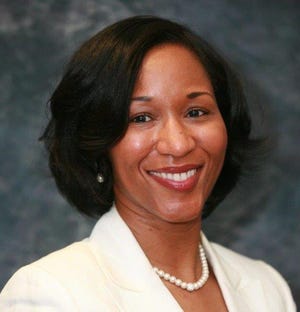Trump picks first black female judge nominee as he tries to fill Mich. vacancies

Washington — President Donald Trump has finally moved to nominate candidates to fill two vacancies on the federal bench in Michigan, including the first African-American woman he's picked to be a judge.
Trump has tapped U.S. Magistrate Judge Stephanie Dawkins Davis of Flint, a former federal prosecutor for 18 years, to sit on the U.S. District Court for the Eastern District of Michigan, the White House said Friday.
Trump also intends to nominate Michael S. Bogren, a municipal attorney at the firm Plunkett Cooney in Kalamazoo, for the U.S. District Court for the Western District of Michigan, according to the White House.
The vacancies have been open for over two years. Former Chief Judge Gerald E. Rosen in Detroit retired in late 2016, and Judge Robert Holmes Bell in Grand Rapids left in early 2017.
Judges nominated by a Democratic president hold a 14-6 advantage in the Eastern District of Michigan, while Republican-nominated judges have a 4-0 majority among judges in the Western District.
The nominations followed months of negotiations between the White House and U.S. Sens. Debbie Stabenow, D-Lansing, and Gary Peters, D-Bloomfield Township.
“One of my most important duties as a U.S. senator is evaluating the qualifications and experience of judicial nominees," Stabenow said in a statement.
"Today’s announcement is welcome news following months of bipartisan discussions with the White House. I look forward to the Senate Judiciary Committee considering these nominees.”
The last African-American woman nominated to a federal judgeship was former Minnesota Supreme Court Justice Wilhelmina Wright by President Barack Obama in 2015.
Until Friday, Trump had nominated no African-American women to the federal bench, said Carl Tobias, who studies the federal judicial selection process at the University of Richmond School of Law.
Trump has nominated five African-American men as judicial nominees, only one of whom has been confirmed, Tobias said.
Davis' legal background
Davis was appointed a magistrate judge in January 2016 and assigned to the Flint federal courthouse.
One of her most high-profile cases to date involved arraigning Amor Ftouhi in the 2017 terrorism and stabbing attack at Bishop International Airport. Ftouhi was later convicted and faces up to life in prison.
Davis, a native of Kansas City, Kansas, started her career in 1992 as a civil defense attorney at the firm Dickinson Wright PLLC before joining the U.S. Attorney’s Office in the Eastern District in 1997.
Davis, 51, started at the U.S. Attorney’s Office in Detroit around the same time as future U.S. Attorney Barbara McQuade. McQuade appointed Davis as her executive assistant U.S. Attorney after taking office in 2010 — a post she held through 2015.
“I had seen her work up close in the best of times and in the worst of times, and it was difficult to tell the difference between them because she was always professional and unflappable,” McQuade said Friday.
Davis, an only child raised by a single mother in Kansas City, is bright, hard-working and was a great trial lawyer, she added.
“She has great respect for the rule of law, which I think is incredibly important at this point in history,” McQuade said. “And she has some life experiences that will help her relate to litigants.”
One of her last major cases as an assistant U.S. attorney was as part of a team prosecuting former Detroit Treasurer Jeffrey Beasley and others in a corruption trial involving the city’s pension funds.
The high-profile case aired allegations that Beasley and two others defrauded the bankrupt city's pension funds by accepting kickbacks and bribes in exchange for approving $200 million in corrupt deals. Beasley was sentenced to 11 years in prison in 2015.
Davis also served as a deputy unit chief of the Controlled Substances Unit and as high-intensity drug trafficking area liaison.
GOP, Democratic mentors
In 2015, she won a 2015 “Champion of Justice” award from the State Bar of Michigan for going “above and beyond” the call of duty as a federal prosecutor.
Davis was involved in community initiatives such as the Advocates and Leaders for Police and Community Trust and co-chaired the Detroit Youth Violence Prevention Initiative.
At the time of the award, Davis praised former U.S. attorneys Saul Green and McQuade, both Democratic appointees. McQuade had nominated her for the award.
Davis also described then-Michigan Supreme Court Justice Mary Beth Kelly, a Republican appointee, as her first mentor and someone who helped start her career.
Kelly said she mentored Davis when they worked together at the Dickinson Wright law firm in the 1990s and “found her to be a very dynamic and brilliant young lawyer,” she told The Detroit News.
“And she’ll make a fine federal judge,” added Kelly, who now works at JAMS Mediation, Arbitration and ADR Services in Detroit.
Kelly said she also serves with Davis on the Detroit Mercy Law School advisory board and believes she’ll be “very fair and very patient” on the bench.
“Her judicial temperament will be well-regarded by lawyers, and I think that she’ll be very mindful of the law. She’s had great respect for the law throughout her whole career," Kelly said.
She said she does not view Davis as a political person, noting that the judiciary is “truly a nonpartisan position, and I think good judges recognize that and honor that.”
Trump’s judicial appointments have generally been “quality” picks “to a lot of people’s surprise,” Kelly said. “I think people may have expected him to be more partisan than he has been.”
Davis was a young student in Kansas she became interested in the law because of the case Brown v. Board of Education, which in 1954 declared racial segregation of children in public schools unconstitutional, according to a Federal Bar Association newsletter.
She graduated from Wichita State University in 1989 and Washington University School of Law in St. Louis in 1992. She has been married for 26 years and has three adult children.
"The magistrate judge position is an increasingly important source from which senators and presidents draw because MJs secure much relevant experience that is valuable for district court service, while many assistant U.S. attorneys are tapped because they have spent their careers in federal courts," Tobias said.
"I think that she will fare well in the Senate, as she has two decades of very relevant experience."
Bogren's background

Bogren, 61, grew up in Parchment and lives in Hastings. He primarily represents municipalities in civil rights and constitutional law, as well as serves as attorney for the Village of Hopkins.
He got the call Friday afternoon from the White House counsel's office informing him of the nomination after interviewing for the job in June 2018, he said.
"It’s a great honor. Beyond that, I’m really kind of speechless," Bogren said.
He started with the firm in 1985 and now serves as chairman of Plunkett Cooney’s board of directors and as managing partner of the firm’s Kalamazoo office.
Bogren got an $80 million lawsuit dismissed on behalf of a city that was sued after denying a developer a permit to build a 425-megawatt coal-burning power plant on Lake Michigan, according to the firm's website.
He also obtained summary judgment for a municipality sued for negligence when a headstone in a cemetery fell onto a 9-year-old, causing severe brain damage. The court ruled that maintaining the cemetery was a governmental function, giving the city immunity, according to the firm.
Bogren graduated from Western Michigan University in 1979, majoring in English literature and linguistics, and from the University of Detroit School of Law in 1982.
He's married with two adult children.
mburke@detroitnews.com